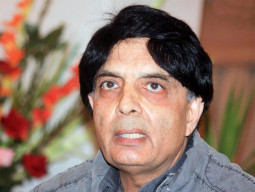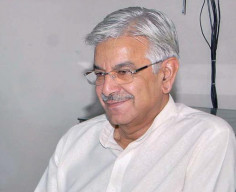
Taking a welcome and much-needed initiative, the government has moved fast to dispel burgeoning rumours of a rift between the government and the military. With reports of differences beginning to spread, Chaudhry Nisar Ali Khan stepped in on Sunday with a level-headed press conference to do some overdue firefighting. Whether the fire was real or perceived is another question; but a proactive response was required nonetheless because such perceptions can give birth to misgivings that can then spawn into actual problems — particularly when we’re dealing with an issue as historically sensitive as civil-military relations.

According to media reports, the differences between the government and the military are twofold: one, on the trial of former army chief Gen (retd) Pervez Musharraf; two, on the release of Tehreek-e-Taliban Pakistan (TTP) prisoners. The first issue, that of Musharraf’s trial, has been deliberated upon in this space before. In short, the apparent difference, which came to the fore after a deeply provocative statement by army chief Gen Raheel Sharif last week, has more to do with the public trial — that is, slanderous statements by some cabinet members regarding Musharraf — than the actual in-court trial itself. While ideally neither case justifies a threat — veiled or otherwise — by the military, the former situation is decidedly different from the latter, and must be read as being so, despite the fanciful prognoses of doom being offered up on the media. The interior minister’s comments on the matter on April 13 should be afforded some extra legitimacy given that he did not skirt the issue and addressed the problem head on and frankly — being honest enough to admit that there were indeed ‘irritants’ to the relationship. But in the same breath, he also said that they would be overcome, that civil-military relations had never been better and that the military was fully-cooperating with the government.
The second issue apparently creating divisions — that of the release of TTP prisoners — is another point that was in need of clarification by the government. Reports have it that the military is not on board with the prisoner release and that the government did not consult them on the move. The interior minister termed these reports ‘illogical’ — and his dismissive response may well be justified given that, as he himself pointed out, the prisoners are held at military-run internment camps and it would be impossible to keep the military in the dark. There are a few additional notes on this: Firstly, one should consider that the negotiation process is currently a political matter and one that should be decided in and by Islamabad despite any misgivings (if any) that Pindi may have. Secondly, a divergent narrative — whether real or perceived — on the negotiations is necessary keeping in mind that we are not at the point of being fully invested in the process. A perceived opposition by the military will maintain pressure on the TTP which, lest we forget amidst the environment of goodwill, has the blood of thousands of innocent Pakistanis on its hands. That said, keeping the military on board is important, given issues of morale and in the interest of keeping alive a healthy environment of inclusiveness. For this reason, Nisar’s statement that the army was and will be consulted on such matters is welcome and it would be unfair to read them as backing down on the part of the government.
Conversely, a move that would send the wrong signals is Defence Minister Khawaja Asif’s possible dismissal — a move reportedly being contemplated to calm down the anger in the army’s rank-and-file over his controversial remarks about Musharraf. This seeming sacrifice would be a grave setback for a process that has come very far over the last six years and would lessen the standing not only of the government but of democracy writ large since in a democracy, an elected parliament is sovereign. If there is any fixing required here, it should come in the form of a carefully-worded clarification from a man that is, after all, legally the head of the military.
Published in The Express Tribune, April 15th, 2014.
Like Opinion & Editorial on Facebook, follow @ETOpEd on Twitter to receive all updates on all our daily pieces.
COMMENTS (4)
Comments are moderated and generally will be posted if they are on-topic and not abusive.
For more information, please see our Comments FAQ




















































It is the responsibility of the Prime Minister who keeps his cabinet in disciline. Either the Prime Minister set up Abu Ghareb prison 2, or stop the internment of citizenry by the military. The military must accept their function in the constitution or be coached to learn about their role. After the outstanding performance of the forme military leader, now indicted by the court, from staging a coup against the elected Government to riding roughshod on judiciary to the killing spree in Baluchistan and swearing allegance to the foreign country congress, the current army leadership must appease and prove that none other than Parvez Khan was involved.
Rex Minor
Asif Khawaja should be dismissed from the Parliament.
The language and content of the his speech are abominable and disgusting.
Every country respects its army. In Pakistan, the army is the only institution which is credible.
Asif Khawaja not only defied the constitution of the country by going on a harangue against the army, but also trampled the feelings of the masses.
There is absolutely no reason for him to continue as a Federal minister and plunder the national wealth.
Why should the Defence Minister stick around? He no longer has the confidence of the very men and women in uniform that he is supposed to represent after they were exposed to the way he bad mouthed their entire institution in the National Assembly. What good will he do in that role? His outburst was arrogant and laced with stereotypical hyperbole against the military.
As a public figure, one has to be mindful of what is spoken as it remains with one forever in this electronic age. This situation is akin to me bad mouthing Islam and then being made minister of religious affairs. Nobody would accept me. Apply the same logic to the situation that Khawaja Asif has put himself in.